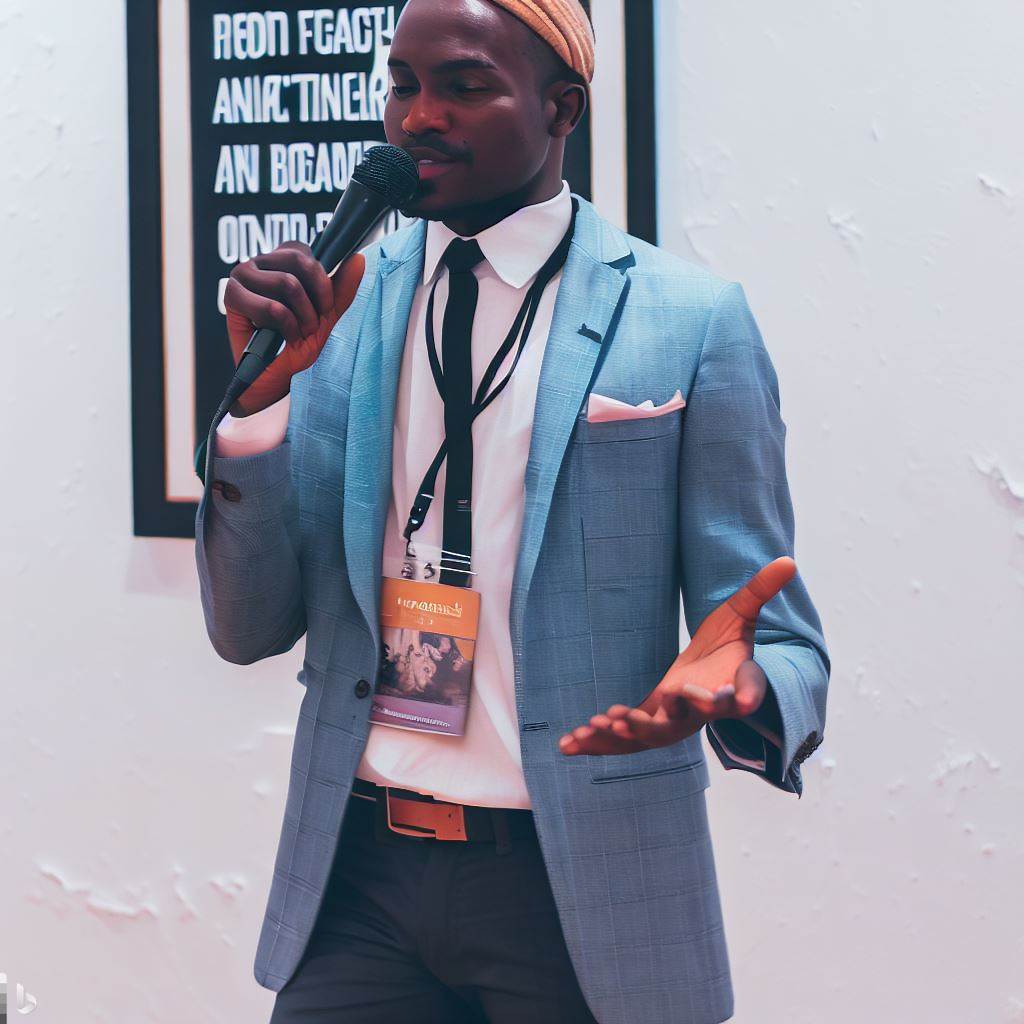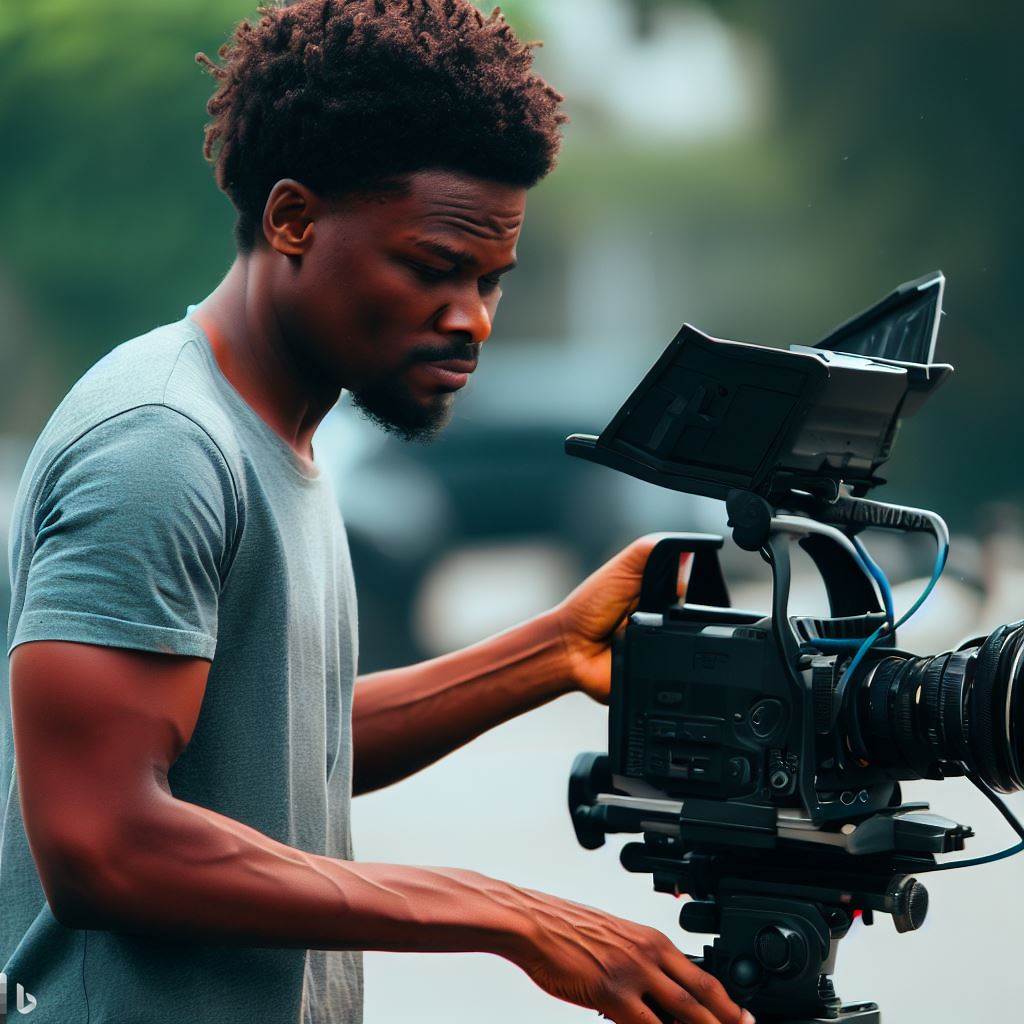Introduction
overview of Nigeria’s art scene and its growth in recent years
Nigeria’s art scene has experienced significant growth in recent years, becoming increasingly vibrant and diverse.
Importance of agents in the art industry
Agents play a crucial role in this industry, facilitating opportunities and bridging the gap between artists and the market.
Brief overview of Nigeria’s art scene and its growth in recent years:
- Nigeria’s art scene has experienced remarkable growth, attracting global attention.
- Diverse styles, cultures, and talents contribute to its vibrant and dynamic nature.
- Nigerian artists like Ben Enwonwu and Njideka Akunyili Crosby have gained international acclaim.
- The country’s art market has witnessed substantial commercial success and cultural recognition.
Importance of agents in the art industry
- Talent Discovery: Agents scout emerging artists and nurture their careers.
- Promotion and Exposure: They connect artists with galleries, exhibitions, and international platforms.
- Negotiating Deals: Agents secure fair contracts, ensuring artists receive just compensation for their work.
- Financial Management: They handle financial matters, providing stability for artists.
- Artistic Guidance: Agents offer mentorship, helping artists evolve their craft.
- Market Access: Agents facilitate art sales and collector connections, boosting artists’ profiles.
- Legal Assistance: They navigate legal complexities, protecting artists’ rights and intellectual property.
- Networking: Agents build industry relationships, fostering collaboration and opportunities.
- International Reach: They enable artists to go global, expanding their reach and recognition.
- Industry Growth: Agents play a pivotal role in driving the growth and sustainability of the Nigerian art scene.
In general, agents are the catalysts behind the flourishing Nigerian art landscape.
Their expertise and dedication are instrumental in shaping artists’ careers and elevating Nigeria’s cultural presence on the global stage.
Exploring the role of an art agent
- An art agent acts as a bridge between artists and the art market.
- They represent artists and promote their work to galleries, collectors, and buyers.
- Art agents assist in negotiating contracts, managing sales, and handling administrative tasks.
- They have a deep understanding of the art market and guide artists in making strategic career decisions.
Definition and responsibilities of an art agent
- An art agent is a professional who advocates for artists and helps to advance their careers.
- Their primary responsibility is to secure opportunities for artists to exhibit and sell their work.
- They handle contractual agreements, pricing, marketing, and promotion on behalf of the artists.
- Art agents also provide mentorship and guidance to artists, helping them navigate the art world.
Key skills and qualities required to become a successful art agent
- Excellent communication skills are crucial to effectively represent and negotiate on behalf of artists.
- Strong networking abilities are essential for building connections with galleries, collectors, and buyers.
- Knowledge of the art market, current trends, and emerging artists is vital to make informed decisions.
- Organisational skills are necessary to manage multiple artists and their diverse needs efficiently.
- Creative problem-solving skills help art agents navigate challenges and find innovative solutions.
How art agents contribute to the development of artists’ careers
- Art agents provide artists with exposure to a wider audience, increasing their visibility and recognition.
- They actively seek opportunities for artists to showcase their work in galleries, exhibitions, and art fairs.
- Art agents ensure that artists receive fair compensation for their creations through negotiations and sales.
- They offer guidance on artistic development, helping artists refine their practice and explore new directions.
- Art agents act as advocates, promoting artists’ work and establishing long-term partnerships.
Overall, art agents play a vital role in the art scene in Nigeria, supporting artists in their career development and contributing to the growth of the art market.
Their expertise, skills, and network help artists navigate the complexities of the art world, allowing them to focus on creating art while the agents handle the business aspect.
By fostering relationships, securing opportunities, and providing guidance, art agents empower artists to reach their full potential and make a difference in the Nigerian art scene.
Read: How Nigerian Journalists are Shaping Policy
Different Pathways to Becoming an Art Agent in Nigeria
When it comes to becoming an art agent in Nigeria, there are various pathways one can take.
These pathways provide aspiring agents with different opportunities and experiences.
In this section we will explore three primary routes that individuals can follow to pursue a career in the Nigerian art scene.
1. Traditional academic education in art-related fields
One pathway to becoming an art agent in Nigeria is through traditional academic education in art-related fields.
Many universities and institutions offer art programs that provide a comprehensive understanding of the art world.
These programs cover various aspects, including art history, studio art, and art management.
Through these courses, individuals can gain a strong foundation in art theory, develop critical thinking skills, and build a network within the art community.
2. Apprenticeships and mentorships with established art agents
Another pathway to becoming an art agent in Nigeria is through apprenticeships and mentorships with established art agents.
This route offers the chance to learn from experienced professionals who have already established themselves in the industry.
By working closely with a mentor or as an apprentice, individuals can gain firsthand experience in managing artists, negotiating deals, and organising exhibitions.
hands-on approach allows them to acquire practical skills and industry insights that can be invaluable when starting their own careers as art agents.
3. Transition from a different career or background into the art scene
For those who come from a different career or background, transitioning into the art scene can be a viable pathway to becoming an art agent in Nigeria.
Many successful art agents have backgrounds in fields such as marketing, public relations, or business administration, and leverage their existing skills to navigate the art world.
This pathway provides a fresh perspective, as individuals can bring their expertise from other industries and apply it to the art market.
Through extensive research, networking, and building relationships with artists and collectors, they can establish themselves as art agents.
Each pathway offers unique advantages and challenges, and aspiring art agents must carefully consider which route suits them best.
Some may prefer the structured approach of academic education, while others may thrive in the hands-on environment of apprenticeships.
For those seeking a career change, the transition pathway allows them to bring a fresh perspective and capitalise on their existing skills.
Regardless of the chosen pathway, becoming an art agent in Nigeria requires a passion for art, a deep understanding of the local art scene, and a relentless drive to support artists.
It is a demanding yet fulfilling profession that plays a crucial role in shaping the Nigerian art landscape.
In the next section, we will delve into the skills and qualities that are essential for success as an art agent in Nigeria. Stay tuned!
Read: Internationally Recognized Nigerian Mixing Engineers: A Profile
Challenges Faced by Aspiring Art Agents in Nigeria
Being an art agent in Nigeria comes with its own set of challenges. Aspiring art agents often struggle with various obstacles that hinder their path to success.
1. Lack of Formal Art Agent Training Programs or Institutions
The absence of formal art agent training programs or institutions in Nigeria poses a significant challenge for individuals aspiring to become art agents.
Unlike other professions, such as law or medicine, there are no established educational pathways or recognised certifications specific to art agency.
This lack of formal training hinders the development of essential skills, knowledge, and industry insights required to excel as an art agent.
Aspiring art agents often have to rely on self-teaching, informal mentorship, and learning from experienced art agents.
Though somewhat helpful, these methods might lack in-depth grasp of art market, legalities, negotiation, and client management crucial for success.
2. Limited Access to Resources and Networking Opportunities
The limited access to resources and networking opportunities in Nigeria’s art scene creates a significant obstacle for aspiring art agents.
Unlike art hubs like New York, London, or Paris, Nigeria’s art market is still emerging and relatively smaller.
This scarcity of resources, including art galleries, exhibitions, art fairs, and industry events, makes it challenging for aspiring art agents to connect with artists, collectors, and other stakeholders.
Networking plays a crucial role in the art agency profession, as it helps art agents build connections, establish partnerships, and gain visibility within the art community.
However, the lack of organised platforms and events for art networking in Nigeria hampers the growth and progress of aspiring art agents, limiting their access to potential clients and collaborators.
3. Overcoming the Stigma and Misconceptions Surrounding the Role of an Art Agent
The role of an art agent is often misunderstood and stigmatised in Nigeria’s art scene.
The misconception that art agents are solely profit-driven intermediaries who exploit artists hinders the acceptance and recognition of their valuable contributions.
This stigma makes it challenging for aspiring art agents to establish trust and build relationships with artists, as well as convince sceptics of their genuine intentions.
Overcoming this stigma requires art agents to educate the art community about their role in providing guidance, representation, and advocacy for artists.
It also involves creating transparency in business practices, demonstrating ethical conduct, and showcasing successful collaborations and achievements.
Generally, aspiring art agents in Nigeria face various challenges on their path to success.
The lack of formal training programs or institutions, limited access to resources and networking opportunities, and the stigma surrounding the role of an art agent all create significant obstacles.
However, with perseverance, resilience, and a proactive approach, aspiring art agents can overcome these challenges and carve a successful career in Nigeria’s art scene.
Read: Nurturing Talent: The Role of Mentorship in Mixing Engineering in Nigeria

Success stories of Nigerian art agents
- Anita Okoye, co-founder of ArtCaffeine, successfully connects emerging artists with buyers and galleries.
- Tunde Aladese, known for his dynamic approach, has helped many artists gain recognition nationally and internationally.
- Bisi Silva, founder of CCA Lagos, has transformed the Nigerian art scene by promoting contemporary art.
- Bob Manecksha’s innovative strategies have led to the rapid growth of his agency, ArtForce.
- Chinwe Uwatse founded ArtConnect Africa, a platform that showcases Nigerian artists and connects them with international buyers.
- Uche Edochie, with his extensive network, has helped many Nigerian artists secure high-profile commissions.
- Chief Daddy, a renowned art agent, has earned a significant reputation for nurturing young talent.
Profiles and achievements of notable art agents in Nigeria
- Anita Okoye’s exceptional networking skills have led to collaborations between artists and major brands.
- Tunde Aladese has successfully organized several art exhibitions, resulting in increased exposure for the artists.
- Bisi Silva’s efforts in curating exhibitions have received international acclaim and recognition.
- Bob Manecksha has facilitated lucrative art deals, enabling artists to achieve financial success.
- Chinwe Uwatse’s platform, ArtConnect Africa, has been instrumental in launching the careers of emerging artists.
- Uche Edochie has represented Nigerian artists in prestigious international art fairs and exhibitions.
- Chief Daddy’s mentoring and guidance have shaped the artistic journeys of numerous aspiring artists.
Lessons learned from their journeys
- Building strong relationships and networks within the art industry is vital for success.
- Adopting innovative strategies and approaches helps artists gain recognition in a competitive field.
- Curating exhibitions and organising art events can significantly enhance an artist’s visibility and career prospects.
- Engagement with international markets and collaborations with brands can accelerate an artist’s growth.
- Providing mentorship and guidance to upcoming artists can have a profound impact on their success.
- Flexibility and adaptability are essential qualities for art agents to navigate the ever-evolving industry.
- Promoting and supporting contemporary art can contribute to the overall growth of the Nigerian art scene.
Impact and influence of their work on the Nigerian art scene and artists
- Nigerian art agents have facilitated the emergence of new talent in the art scene.
- They have played a crucial role in connecting Nigerian artists with buyers and galleries.
- Their efforts have contributed to the international recognition of Nigerian art.
- Art agents have created platforms that promote dialogue and engagement within the art community.
- By showcasing Nigerian artists globally, they have expanded opportunities for cultural exchange.
- Art agents have elevated the status and value of Nigerian art in the global market.
- They have inspired and mentored a new generation of Nigerian artists, fostering artistic growth.
Influential artists often become cultural icons, leaving a lasting legacy that continues to evolve and inspire future generations of artists.
Read: Key Skills Every Successful Nigerian Mixing Engineer Should Possess
Tips and Advice for Aspiring Art Agents in Nigeria
Are you passionate about the art scene in Nigeria and interested in becoming an art agent?
Here are some tips and advice to help you navigate your way through this exciting and dynamic industry.
Developing a Strong Knowledge and Understanding of the Local Art Scene
- Immerse yourself in the Nigerian art scene by visiting galleries, attending art exhibitions, and participating in art festivals.
- Read books, articles, and blogs about Nigerian art history, prominent artists, and trends in the industry.
- Take art courses or workshops to enhance your understanding of different art forms, techniques, and artistic processes.
- Connect with local artists, critics, and experts in the field to gain insights and deepen your knowledge.
- Stay updated with art publications and journals to be aware of emerging artists and new art movements.
Building a Network of Contacts within the Industry
- Attend art-related events, conferences, and workshops to meet artists, collectors, gallery owners, and other art professionals.
- Join art associations, clubs, and organizations to connect with like-minded individuals and expand your network.
- Utilise social media platforms to engage with artists, galleries, and art enthusiasts, and to promote your own expertise.
- Cultivate relationships with gallery owners, curators, and collectors who can provide insights and opportunities.
- Collaborate with other art agents or professionals to expand your network and share resources and knowledge.
Continuous Learning and Staying Updated with Current Trends and Practices
- Attend workshops, seminars, and training programs to stay updated with the latest art market trends and practices.
- Follow art blogs, podcasts, and social media accounts to gain insights into international art trends and their impact on the Nigerian scene.
- Build relationships with international art agents or experts who can share their knowledge and experiences.
- Stay curious and open-minded, constantly exploring new art forms, styles, and genres.
- Regularly visit art fairs and exhibitions, both locally and internationally, to observe and understand market dynamics
Becoming an art agent in Nigeria requires dedication, perseverance, and a deep passion for the local art scene.
Build a solid knowledge foundation, nurture a strong network, and stay current to become a thriving art agent boosting Nigerian art’s prominence.
Discover More: Makeup Artists’ Contributions to Nigerian Television & Film
Conclusion
The significance of art agents in Nigeria’s art scene
Art agents play a significant role in Nigeria’s art scene by bridging the gap between artists and collectors, promoting the work of talented individuals, and contributing to the growth of the art industry.
Individuals interested in pursuing a career as an art agent in Nigeria
For individuals interested in pursuing a career as an art agent in Nigeria, there are ample opportunities to make a mark in the industry.
With a growing art market and increasing interest in Nigerian art both locally and internationally, being an art agent can be a fulfilling and lucrative profession.
However, it is essential to understand the demands and challenges that come with the role.
Agents should possess strong communication and negotiation skills, be knowledgeable about the art market, and have a keen eye for talent.
Final thoughts on the future prospects and opportunities for art agents in Nigeria
Becoming an art agent in Nigeria is an exciting and rewarding career choice.
As the Nigerian art scene continues to flourish, the demand for competent agents will only increase.
By supporting artists, facilitating exhibitions and sales, and creating meaningful connections, art agents contribute to the overall development of the art industry in Nigeria.
If you have a passion for art and a desire to connect artists with opportunities, becoming an art agent in Nigeria may be the perfect path for you.
Don’t hesitate to pursue your dreams and make a meaningful impact on the art scene.




